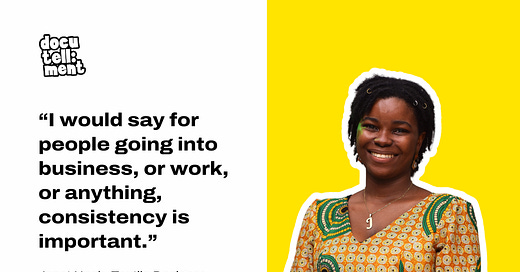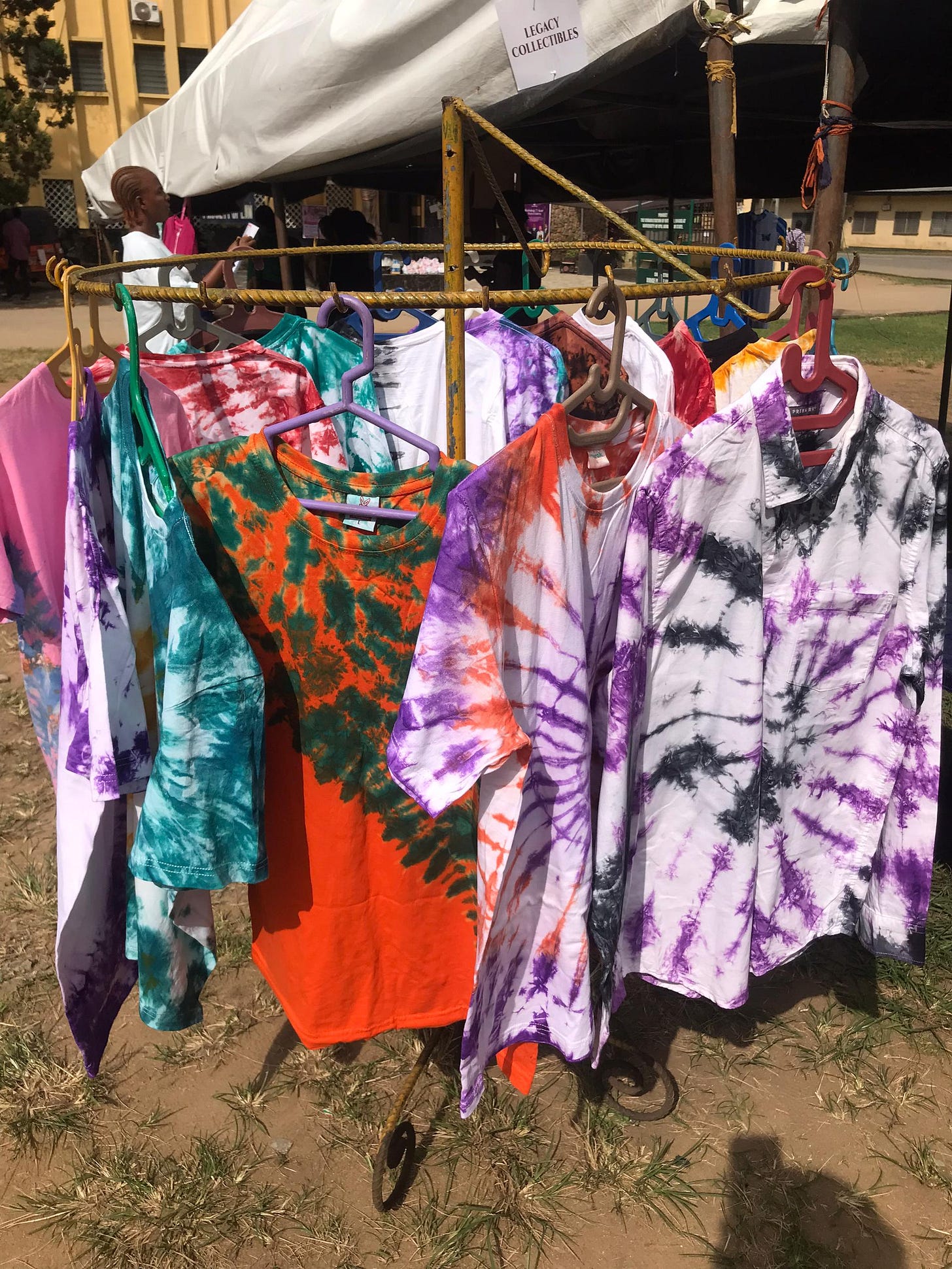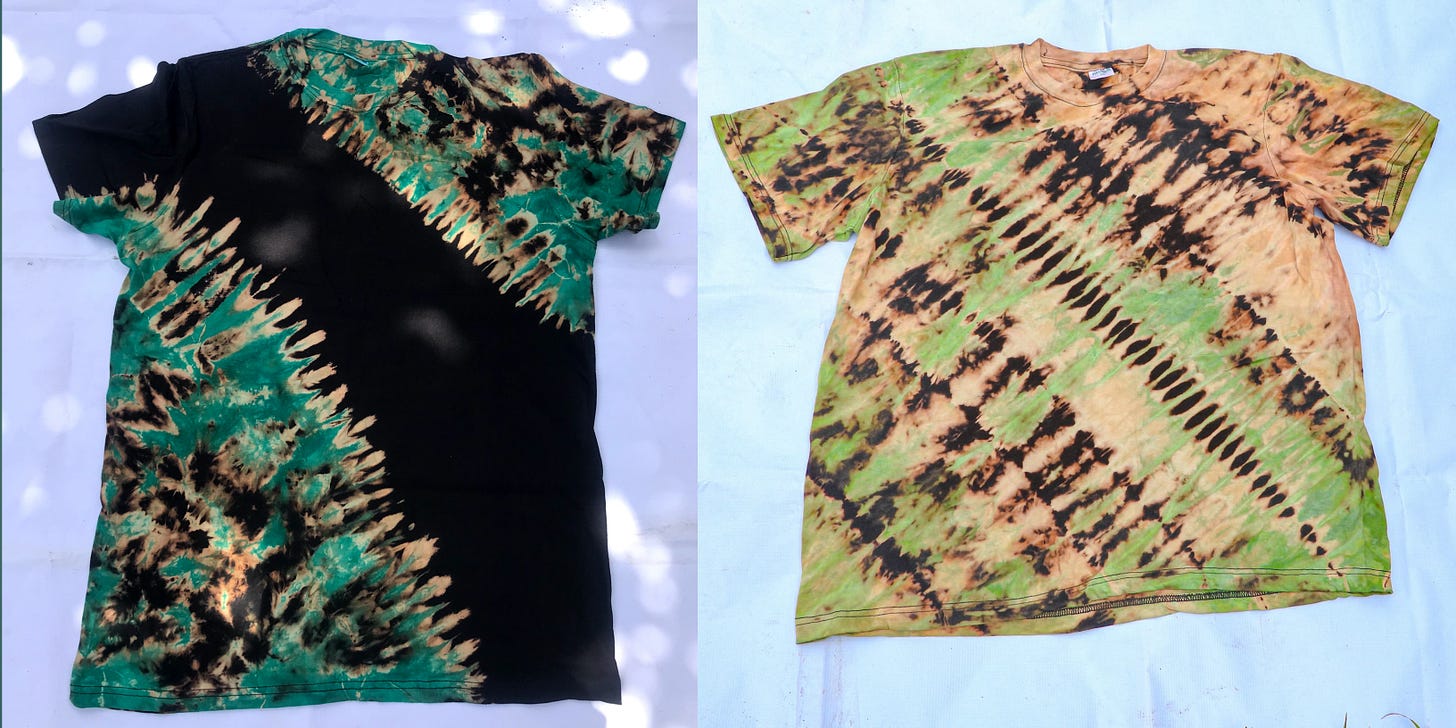Designing Destiny: Janet Noah’s Consistent Path to Textile Success in Nigeria
Janet Noah discovered textile through the fine arts club in secondary school. Now she lives through the art as The Adiré Girl.
Driven by a renewed interest in crafts like adiré, batik, and aṣọ òkè, crafts very common in the Southwestern parts of Nigeria, textile design has seen significant growth over the past decade both nationally and internationally.
Social media has provided designers with wider market access and opportunities for creative expression. This has been the case for Janet Noah. After finding herself in the adiré business, she has gone on to become a household name for the craft in Uyo and other cities in Nigeria.
In this interview, Janet shares her early experiences with adiré and batik, tracing her path from a primary school arts club to running a successful business. She also talks about balancing her life as a 300 level radiography student and a writer too.
*The interview has been edited for length and clarity.
Hi Janet, good evening. How are you doing?
I'm fine, how are you doing?
Very well, thank you. So, can you tell us a bit about yourself?
Okay. My name is Janet Noah, I'm a textile designer and a 300 level radiography student in the University of Uyo. As a textile designer, I make fabrics and clothes. I design clothes from the colouring, to the finishing and the dyeing of the clothes. I make adiré, batik clothes and print. Those are the different types of textile designing that I'm involved in. And I've been at it for two years now.
Okay, that’s great. What got you interested in adiré?
The first time I heard about adiré was in primary school where we had clubs. We had JETS club, home economics club, then fine arts club. I was one of the pupils in primary five that were chosen for the fine arts club exhibition.
So I went to the exhibition and I was with the group making batik. That was my first experience with batik. Funny how although I had chicken pox that day, I still wanted to go to school because I really wanted to be part of it. We did it and I still have the fabric from that day. After that, I went to secondary school. I just did fine arts from JS1 to JS3. I didn't join the fine arts class in SS1 because it was an optional course and I was more interested in home management. When I was in SS2, we had a new fine arts teacher that was particular about craft.
She tried pushing the school for people to make more adiré clothes. That term, she announced during chapel that the class was 5,000 naira (5k) and I asked my sister, “What is adiré that people are paying 5k for?” Something that we did in primary school. I wasn't interested.
When we were preparing to write WAEC, COVID-19 happened and we had to go home. I went to one of my friends that was in uni at that time and joined a free skill acquisition class on adiré. I did not have a phone then, so I used my mum's phone and after that, I started using a laptop to watch videos on YouTube. From there, I learned how to make adiré, although I never practiced because of COVID-19.
When I went back to school for SS3, I had a classmate, Nsikak, who used to draw and was already running a business. He used to draw for teachers and others. I just went to him and asked for advice. He told me things needed to set up a business and in the second semester of my first year in the university, I officially started making adiré. I made the first t-shirt and snapped it. No background, just as it was hanging. I posted it online. When I did, people saw it. They told me it was beautiful.
Two days later, someone posted somewhere on a group that she needed someone who makes adiré. People mentioned me, she sent a message and we got talking. She said she needed two, gave me the money and I made them for her. That was the second time I made an adiré cloth and it was for a customer. From there, I started making more of it. When I started, I didn't think it was going to be a career path. I didn't think it was something that I was going to do for long. But as I started, I got very interested in the business. I had more passion and I've been doing it for two years now.
Something I forgot to add, before I started doing that as a business, I used to sell groundnuts. I would make groundnuts and keep them in my aunty’s shop. After that, I went ahead to learn how to sew. But it wasn't sewing or female fits or sewing of all those urban ways. Remember all the plans I wrote from SS3? I just kept them aside. It was until something happened at work and I stopped sewing. That was when I started making adiré. So I had tried other things before I finally settled there.
You said you didn't intentionally go into the business, right? When you found yourself in the business, what did you do?
Okay, when I got settled into the business, the first thing I did was to go back to that friend who did the free adiré class and he gave me the contact of someone who runs the business in Lagos. I spoke to him and we had a one-on-one online class. He would send videos and all those other things and whenever I needed to do anything, I could easily reach out to him.
I took other classes. For example, there was this program that used to be conducted by the government of Akwa Ibom State, MEGP (My Entrepreneurial Goal Program). There I learned more about business because it taught leadership. It learnt how to set business goals, marketing through different social medias and how to handle them. After that, I took a digital training course at HerTechTrail still to learn how to run my business.
There were other things. I bought books, I tried meeting people that knew how to market businesses one-on-one and had sessions with them where they would tell me different things to do. Then I think the very last thing that was the breaking point for me was when I I took Didi Bab's class for business and discovered a lot about businesses.
We started from scratch; the vision, mission, sorting out our target audience, how to sell to them. We worked on the visuals and every other part of the business. And it required a lot of consistency because there were a lot of assignments. But since then, I have kept myself knowledgeable with the different things that are going on with businesses. Also, every now and then, if I see classes that I'm interested in, I still pay for them and attend. I think I've done Facebook marketing and a couple of other things just to know what is going on with business and marketing. That's all.
Very interestingly, I think I've mentioned before that I see how intentional you are with talking about your business, ensuring that one way or the other, the word goes out. Do you think there are textile designers that have influenced the way you do your business?
Okay, so the first person will be the person that taught me adiré for 10k, Daniel. That was when I was ready to start it as a business. Then, he was just making t-shirts and all of that. Well, now, he's into a lot of fabric making and even batik. I'm currently learning batik. He has been one of the people that have motivated me. Another person is Crescent. She's also a textile designer and she's batik teacher. There's this way she does her business, she has this passion and carries her business on her head. Another person is Cheryl Clothier, she is into adiré too. She makes really beautiful patterns and I met her on X(Twitter). It's the way they consistently talk about the things they do and I've really learned so much from them.
Alright. Are you training anybody? First, do you think you've grown to the point where you can now teach people?
Yes, I think I have because I've had a couple of students. So currently, this year, I've not yet launched any group training. There's a training group that I've not yet launched. But in collaboration with the vice president of University of Uyo Student Union, I currently have a group of eight students that I'm training. Then, I have two other people that I'm teaching privately. We talk one-on-one, we do our training, we have our classes.
So if people are interested in training, all they have to do is send a message and we, we create schedule for private classes, mostly in the evenings so that they can learn well. There are also videos, audios, and eBooks for the training and after that, we round it up with practical classes at my workspace.
Is there anything that training people has done for you? People say that you learn better when you teach other people. How has that been for you so far?
Exactly. When I started teaching, there were times that my students would ask questions. Most times, there were things that I'd never thought about why they were done this or that way. That pushed me to go and learn more. Then I took an upgrade class this year. The fact that I'm teaching people makes me conscious of taking upgrade classes, reading more, learning more, watching what other people are doing so that I can have enough knowledge to dish out to the people I'm training.
Yes, training has really helped me to consistently improve on what I know. I think that's the same train of thought everybody has. But it's good to know that you find out new things while teaching people.
That's beautiful. What do you think are the prospects adiré has? You've had two years experience, do you think it's a really profitable market for people or business for people to enter?
Okay, so adiré is one of the most profitable businesses that I know because it's a cultural thing. People wear occasionally, for weddings, events, and the go-to clothes for those in the western part of Nigeria is adiré. The problem now is in your business, you have to position yourself in a way that they see you. But honestly, there's profit in the business, especially when you buy in bulk from the west. So you buy from bulk, you use it gradually and it's cheaper. There are times people order 100 t-shirts, 200 t-shirts, I've done 200 before. So yes, there are prospects.
Is that just in the west though, because of the cultural heritage? Do you have orders like that from all over the country?
Yes, yes. I do. My business is primarily in Akwa Ibom and for a very long time, the majority of people buying from me have been people in Akwa Ibom. All I needed to do was preach the gospel of adiré, help them to see how good and beautiful the art is and they buy from me. People in Akwa Ibom buy really well. Even when I go for displays, fairs and all of that, most of the people I sell things to are Akwa Ibomites. So yes, I do.
In the long run, how do you see yourself expanding in this field?
So expanding in this field, I think the very first thing on my mind is relocation.
Okay. Why, though?
Yes, relocation to the west because there is a more accessible market and division of labour too. So in most of those places, they have adiré malls where there are people that tie clothes and other people that dye the clothes, you just pay them. There are also other people who beat the clothes. There’s this stone-like stuff that we use to beat them. So yes, there's division of labour and there's access to more people, access to employers and access to customers. For me, I would love to relocate, but I would still love to maybe have a branch here, have another branch in the west and run both of them simultaneously. I would really love that.
It is giving rich-aunty. Are there any textile arts, with Ibibio Heritage or the Akwa Ibom heritage that you can start here? Do you know any?
It's the rich aunty for me. (Laughs) Okay, I've never thought about it. I've just always been about adiré. So I'll have to check for things with Ibibio Heritage that I can do. Maybe, there's raffia making. I know there's a big raffia making market in Ikot Ekpene.
Yeah, people are most likely going to buy things that I think they can culturally relate to. Now what do you think people can do better in this space, like to encourage entry? First of all, do you think it's saturated? Let's start from there.
It's not saturated. I think the first thing that we need to do is to preach the adiré gospel. That's how I say it. Let's talk more about it. Let people know the importance of this thing and make them want to do it. Talk about the benefits, how profitable it is and its method of use. I also think people making adiré should try to share their experiences more. They should share experiences like when they make clothes for customers, maybe for their pre-wedding photos and all of that, the way the customers react, the way the customers love the clothes and all of that.
That's really good. You're a student and you're a writer from what I've seen. How do you balance this interest and your craft with school?
Okay, so apart from textile designing, I ghostwrite and also have a blog. I have a job with a monthly pay. I do other projects on the side. For me, the most important thing that helps me is the fact that I try to put my to-do list together early enough. So before the day is over, I write all the things I need to do for the next day. I group them into things that are urgent and important, not urgent but important, not important and not urgent. So that by the end of the day, I've done the things that are more urgent and important. And maybe if I have a few things left, it will be things that are not urgent and not important. Then also I try to start early with my school work. When school starts, I try to read early. So when exams come, I'm not too overcrowded with what to read. Also, I try to let go of some jobs. Because there are times that maybe a ghostwriting job comes. So I just prepare my mind that there are things I'll have to give up on.
Any final words? Advice you'd like to share? Something you live by that you feel like people should know?
I would say for people going into business, or work, or anything, consistency is important. You can't do something today, not do it tomorrow, not do it next tomorrow, do it two months later and expect it to yield the fruits that you need. You have to be consistent over a period of time. When a time comes that your business or your work, your company can run without you, then you understand that your consistency has paid off. The times where you can randomly take breaks and it won't affect your business. So for me, I believe that consistency is very important. If you want to achieve a goal, the only limitation to achieve your goal is your mind or you. There are goals that I've set for myself that I never thought was possible to achieve. But I break them into little things and from the little things, I do them step by step. That's all.
That was very, very important because I particularly know the importance of consistency. Thank you so much, Janet. Are there channels we can follow you and see your work?
I'm very active on Twitter. My twitter handle is @JanetNoah5. But if you search for The adiré girl, you'll definitely see me. It's @the_adiregirl on Instagram and the business page is @a.jhay_signatures. On Facebook, Janet Noah.
Janet writes on Substack:
.Follow/connect with Janet here: LinkedIn, X (fka Twitter), Facebook and Instagram.
Did you like this story? Like and leave a comment below.💚
Would you like to feature in our next issue? We'd love to hear from you!








Made me want to start an Adiré wearing phase myself. Nice one. 👍